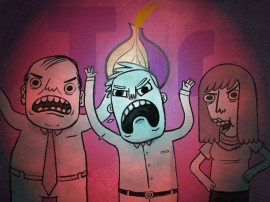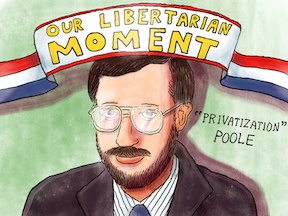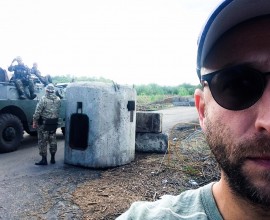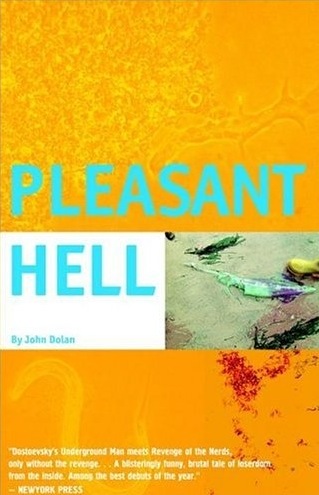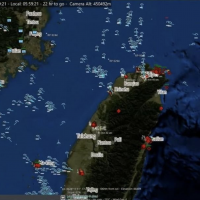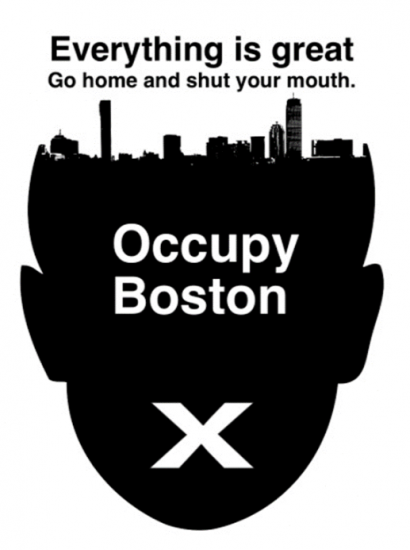
BOSTON—Occupy Boston! It was one of the last big ones to get cleared out, as I understand. I wasn’t there for the police clearance operation–but I was there the night before, when OB chumped down Boston Mayor Tom Menino, at least temporarily.
I’m not an occupier as such: I never camped at Occupy Boston, and I can’t claim to have been a big player in what went on. Some friends and I went to marches regularly, and made new friends at them. The Boston bunch is interesting, along with the usual cast of activists and people from the anarchist and red circuits, you get types characteristic of New England: kids with the clothes, accents, and (the most convincing elements) sallow skin and bad teeth of the local white working class talking anarchy and trans rights; WASPy late-middle-aged engineers biking in from MIT in their best windbreakers and wire-rim glasses; bro-dudes from BC, BU, and Northeastern who’ll start a chant of “OCCUPY! SHUT IT DOWN! BOSTON IS THE PEOPLE’S TOWN!” faster than they will “YANKEES SUCK!” It felt good to be a part of it, even in my limited way.
Occupy Boston had had some scares before 12/09. Occupy Boston lived at Dewey Square, part of the Rose Kennedy Greenway, a group of little parks strung out over the Route 93 tunnels in downtown Boston, publicly owned but privately run. On Columbus Day, a group of occupiers took control of another sliver of the Rose Kennedy Greenway. Some friends of mine and I who had been there for the marching were there: some of stood to defend the Dewey Square camp (rumors were flying that the cops were going to take this opportunity to clear out Occupy Boston entirely), some of my other friends recorded it:
The cops followed what my friend who recorded that video, Gene, said was standard procedure: they waited until two or so in the morning (after the subway system was closed), surrounded the area with hundreds of cops– I was there, there were at least three hundred– get the “Special Operations” guys to make a breach (stomping on Veterans for Peace to do so), and drag the rest out. That was around the time Mayor Tom Menino, whose been in office for nearly twenty years, started his double talk: he was down with the protestors, but “civil disobedience has no place in Boston.” A showdown was probably inevitable from the beginning, but Menino’s mush-mouthed Tracy-Flickisms added a certain farcical element to the proceedings, like the Jacobins being lectured by a finger-wagging family restaurant owner.
Occupy Boston kept up the pressure, mounting marches and filing a preemptive restraining order against the police, which a judge upheld for a while. The judge later on revoked the order, citing health and safety concerns (I was at that camp dozens of times: there are five or six bachelor houses in this city I party at which are considerably dirtier). My friends and I had worked out contingency plans, how to get to Dewey if the cops raided with little warning late at night (our subway system closes at about 12:30), who was willing to go how far. As it turns out, we didn’t need them: the judge announced her revocation of the restraining order in the morning, and by that afternoon, Menino and Police Commissioner Ed Davis were announcing an imminent eviction. The subway would take us to the confrontation after all.
My friends and I got down there in time for General Assembly. The GA was tense and dramatic, but the real action was the continuing influx of people. Every time you looked around, the sea of people got bigger, filling the avenues between the tents, milling around on the sidewalks, hanging out across the street. The Veterans for Peace came out, there was a marching band playing, a group of Quakers stood at one of the entrances of the park, and the people kept coming. After the decision was made by the GA to defend the camp, people began dismantling some of the tents and taking away supplies they didn’t want the cops to trash, and the tension started to mount. We were given a midnight deadline to leave: midnight came and went, and while there were more cops around, there didn’t seem to be any “staging”: riot cops need to form up like Broadway showgirls before they do their thing, and there was no sign of that.
I was feeling tense from wondering what I’d be willing to do if the cops did come– and feeling achy: I’m fat, I’d been standing all night, and my back hurt. Maybe the tension was more in my mind than real, but just when it seemed it was going to boil over, someone, either a genius or just lucky, got people to occupy Atlantic Avenue. It started as an extension of the milling crowd, which I estimate as being around 2500 people; it turned into a dance party when the marching band came in; it developed into part of tent city when Direct Action folks, grinning ear to ear, started pulling their tents into the road. The cops had already shut down that block of Atlantic, but now it was ours. There were a thousand people dancing and hanging out in the street, not waiting, arms linked, in a park: maybe the cops have contingencies for that sort of situation, but it didn’t look like they did. Exhausted, sore, and confident we had won for the night, my roommates and I cabbed it back to Brighton.
I think the dance party was probably planned by someone: one guy, a fiery redheaded camper, had recommended we do something similar to that, and was voted down by outraged campers who thought he wasn’t taking camp defense seriously. It was probably the best move we had available: the cops would’ve gotten rid of the camp eventually, and Occupy Boston was able to delay them for one more night, even if removing as many of the tents (including the food tent) as they did diminished the long-term sustainability of the camp.
Long-term sustainability wasn’t in the cards in any event. The cops cleared out the camp at five in the morning the day after, when there were only two hundred or so sleepy protestors left, according to Gene, who videotaped it:
I wasn’t there for that: I had final papers due, and I am no hero in any event. Five hundred people came to the next GA at the bandstand in Boston Common last night: Occupy will continue to push the envelope, with or without the Dewey Square camp.
Peter Berard is a graduate student in history. He lives in Boston. You can reach him at goodstudentsvejk [at] gmail.com.
December 19th, 2011 | Comments (5)











